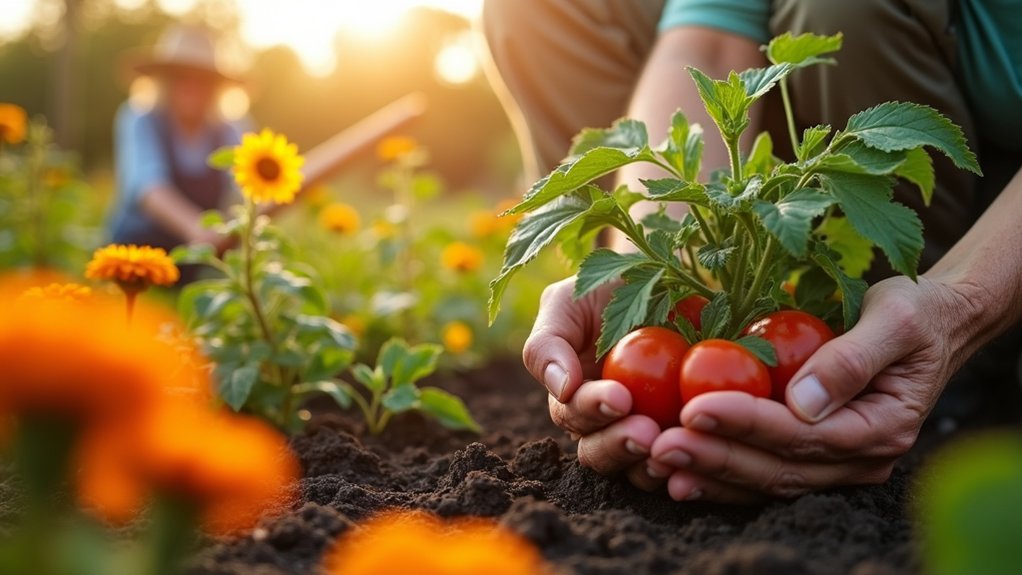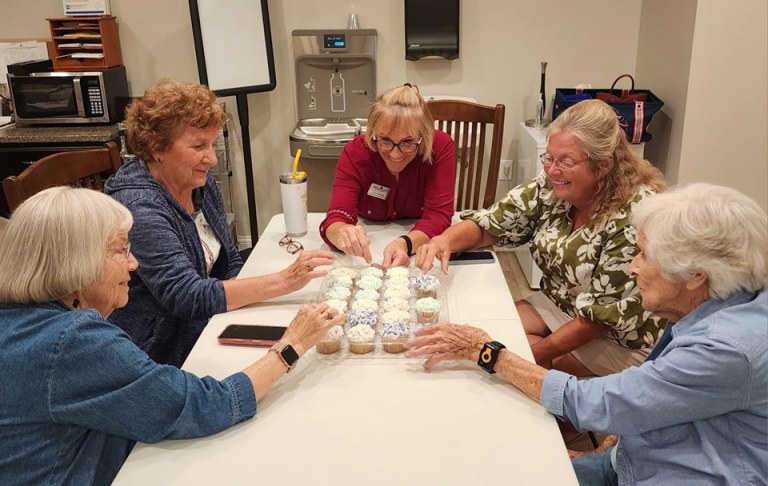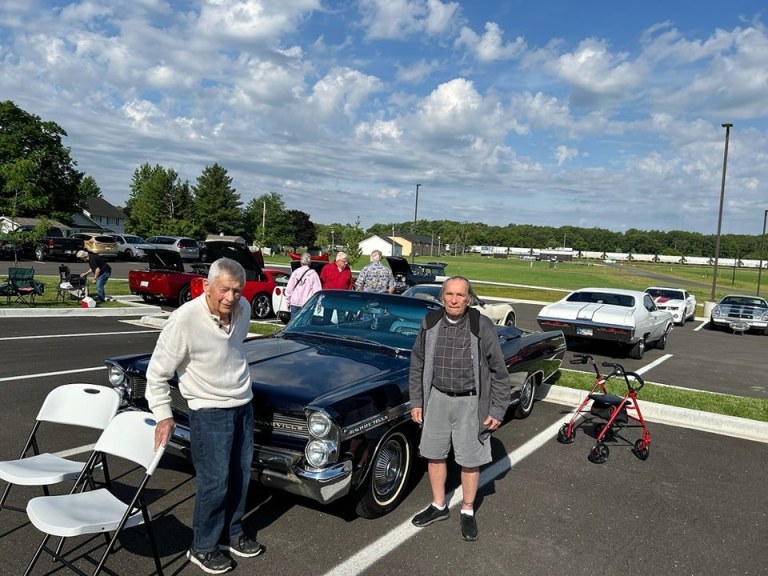You’ll find that gardening in senior communities boosts your cognitive health by sharpening your mind and enhancing memory through hands-on tasks. Planning and planting engage your problem-solving skills, while daily nature exposure delays dementia and lifts your mood. It’s a calming escape, reducing stress with simple activities like watering. Plus, community gardens build social bonds as you connect with others. Stick around to uncover more ways green spaces transform senior living!
Key Takeaways
- Gardening in senior communities boosts cognitive health by enhancing memory and focus through hands-on activities.
- Community gardens foster social connections, reducing isolation and improving mental well-being for seniors.
- Regular gardening tasks stimulate cognitive functions and may delay dementia onset.
- Senior living spaces incorporate gardening to promote stress reduction and emotional tranquility.
- Collaborative gardening efforts in communities create a sense of purpose and strengthen neural connections.
The Mental Benefits of Gardening for Seniors
As you age, keeping your mind sharp becomes a priority, and gardening offers a fantastic way to achieve that. Immerse yourself in the soil, plant seeds, and watch life bloom—it’s a powerful way to boost memory and focus.
Gardening as you age keeps your mind vibrant. Dig into the earth, plant seeds, and nurture growth to enhance memory and concentration.
You’re not just nurturing plants; you’re serving your community by sharing harvests or creating beauty for others to enjoy.
If you’re in short-term care Connersville or seeking temporary senior care Connersville, gardening can be a meaningful activity to engage your mind.
Even during senior respite care Connersville, tending to a small garden plot sharpens cognitive skills. Plan layouts, solve problems, and remember watering schedules to keep your brain active. Additionally, engaging in such activities promotes a sense of community among residents, enhancing their overall mental and emotional health.
How Gardening Reduces Stress in Older Adults
Gardening doesn’t just sharpen your mind; it also soothes your soul, especially for older adults facing daily pressures. As you dig into the soil, you’re not just planting seeds; you’re releasing stress and finding calm.
The rhythmic tasks of watering and weeding offer a peaceful escape, easing anxiety with every gentle motion.
If you’re caring for seniors, consider gardening as a therapeutic tool. It’s a meaningful way to serve others, helping them unwind.
In Connersville, respite care services connersville provide support, while respite care for elderly connersville guarantees loved ones get a break.
With elderly respite care connersville, you can introduce gardening as a stress-reliever, fostering well-being. Additionally, respite care programs offer necessary support and attention, enhancing the overall experience for seniors.
Nurture their spirits—grab a trowel and grow tranquility together.
Boosting Memory Through Hands-On Planting
While tending to a garden, you’ll find it’s more than just a physical activity; it’s a powerful way to boost your memory. As you plant seeds and nurture growth, you’re engaging your brain in recalling steps and tracking progress. This hands-on work strengthens neural connections, helping you retain information better. Additionally, participating in gardening activities within a community setting fosters social connections, enhancing both cognitive health and emotional well-being.
Delaying Dementia With Nature’S Therapy
Beyond boosting memory, engaging with nature through gardening can help delay the onset of dementia. As you tend to plants in a senior community, you’re not just nurturing greenery—you’re safeguarding your mind.
Research shows that regular interaction with nature reduces stress and stimulates cognitive functions, slowing dementia’s progression. You can make a difference by guiding seniors through simple tasks like watering or pruning, offering them calming, purposeful activity. Engaging in social activities also enhances cognitive functions, further supporting mental health.
Your dedication helps create a therapeutic environment where every seed planted fights cognitive decline. Encourage daily garden visits, as even brief exposure to natural settings sharpens focus and lifts moods.
Building Social Bonds in Community Gardens
As you step into a community garden, you’re not just surrounded by plants but by opportunities to forge meaningful connections. Here, you can chat with neighbors while tending to shared plots, swapping stories and gardening tips.
These interactions build trust and camaraderie, creating a tight-knit support system within your senior community.
You’ll find joy in organizing group planting days or harvest celebrations, where everyone contributes. Offer a helping hand to someone struggling with a task, or share your extra seedlings with a friend. Engaging in these cooperative activities aligns with the community’s focus on social connections and enhances overall well-being.
Physical Activity and Wellness Through Gardening
When you immerse yourself in gardening, you’re not just nurturing plants but also boosting your physical health. Digging, planting, and weeding engage your muscles, improving strength and flexibility.
As you tend to the garden, you’re staying active, which supports heart health and enhances mobility—key for maintaining independence. Even light tasks like watering offer gentle exercise, keeping you energized.
Beyond your own wellness, gardening lets you serve others in your senior community. You’re helping grow fresh produce to share, fostering nourishment and joy.
Gardening in your senior community nurtures more than plants; it grows fresh produce to share, spreading nourishment and joy among friends.
Each seed you plant and every harvest you gather becomes a gift, strengthening bodies and spirits. Additionally, many senior communities, like Autumn Trace(your-link-here), emphasize wellness activities that incorporate gardening into their programs. So, grab a trowel, get moving, and make a difference through the simple act of caring for the earth.
Designing Green Spaces for Senior Residents
Many senior residents can benefit from thoughtfully designed green spaces that prioritize accessibility and comfort. As you plan these areas, consider their unique needs. Ascertain pathways are wide, smooth, and free of obstacles so everyone can move easily.
Install benches with backrests and armrests for resting spots that offer support. You’ll also want to include raised garden beds to minimize bending, making gardening accessible for those with limited mobility.
Add shade structures to protect from harsh sun, and choose plants with varied textures and scents to stimulate senses. By creating these welcoming spaces, you’re fostering environments where seniors can connect with nature, relax, and thrive.
Incorporating personalized care approaches can further enhance residents’ experiences in these green spaces. Your thoughtful design can truly enhance their well-being and sense of community.
Success Stories From Senior Gardening Programs
While gardening offers numerous benefits, seeing its real impact on seniors through success stories truly inspires.
Imagine walking into a senior community where residents, like 82-year-old Mary, beam with pride over her thriving tomato plants. You witness how she’s rekindled memories of her childhood farm, boosting her mental clarity and joy.
Then there’s John, who once felt isolated but now bonds with neighbors over shared garden plots, laughing as you help them harvest carrots.
These programs aren’t just about plants; they’re about nurturing minds and hearts. As you serve these communities, you’ll see gardening spark purpose and connection, transforming lives one seed at a time. Moreover, the emphasis on community engagement through such activities fosters a sense of belonging and enhances emotional well-being.
Gardening in senior communities nurtures more than plants—it fosters purpose and connection, transforming lives with every seed sown.
Your support can cultivate these powerful moments of growth and healing.
Overcoming Challenges in Community Gardening
As you plunge into community gardening, you’ll quickly notice that challenges like limited space, varying skill levels, and resource shortages can crop up.
Don’t let these hurdles discourage you; instead, see them as opportunities to serve and unite your senior community.
Tackle limited space by getting creative—use vertical planters or repurpose small areas for shared plots.
Address varying skill levels by pairing experienced gardeners with novices, fostering mentorship and connection.
If resources are scarce, organize community drives to gather tools, seeds, or donations, showing others you care about their involvement. Additionally, consider how social connections fostered through gardening can enhance community bonds and overall well-being.
Tips for Starting a Garden in Senior Living Spaces
Countless opportunities await when you start a garden in senior living spaces. You’re not just planting seeds; you’re cultivating joy and connection for everyone involved.
Begin by evaluating the space—look for sunny spots and guarantee easy access for all residents. Choose low-maintenance plants like herbs or perennials to keep things manageable.
Next, involve the community. Invite fellow residents to share ideas and tasks, fostering a sense of purpose. Use raised beds or containers to accommodate mobility needs, and make sure tools are lightweight. Engaging in gardening activities can also promote cognitive function and reduce feelings of isolation.
Finally, schedule regular group activities in the garden to encourage teamwork and social bonds. By nurturing this green space together, you’ll create a haven of growth and support for everyone in your senior community.
Frequently Asked Questions
What Plants Are Safest for Seniors?
Hey, let’s talk about the safest plants for seniors.
You’ll want to choose non-toxic options like marigolds, pansies, and lavender, which won’t harm anyone if accidentally ingested.
Avoid plants with thorns or sharp edges, such as roses, to prevent injuries.
Opt for low-maintenance varieties that don’t need heavy care, ensuring you can focus on nurturing others.
Create a safe, joyful space with these gentle, friendly plants around!
How Much Time Should Seniors Garden?
Wondering how much time you should spend gardening? Start with just 20-30 minutes a day, a few times a week.
Listen to your body, and don’t overdo it—take breaks as needed. Adjust based on your energy and comfort, gradually increasing if you feel up to it.
Your dedication can inspire others, creating joy and connection. Remember, it’s about enjoying the moment while nurturing yourself and those around you.
Are There Gardening Grants for Seniors?
Hey, are there gardening grants for seniors? You’ll be thrilled to know that, yes, there are!
Look into local community programs or national organizations like AARP that often offer funding to support senior activities.
Check with your local extension office or senior centers too.
You’re making a difference by helping seniors enjoy gardening, so don’t hesitate to apply for these grants and spread the joy of growing together!
Can Gardening Help With Chronic Pain?
Hey, have you ever wondered if gardening can help with chronic pain? You’re in for a treat!
Dig into the soil, plant seeds, and watch life grow—it’s not just rewarding, it’s therapeutic. The gentle movements can ease your aches, distract from discomfort, and boost your mood with every bloom.
Plus, you’re nurturing nature and others by sharing your harvest. Get out there, grab a trowel, and feel the difference!
What Tools Are Best for Seniors?
Hey, let’s talk about the best tools for seniors to make tasks easier and safer.
Grab lightweight tools with ergonomic handles to reduce strain on your hands and wrists. Look for long-handled options so you don’t have to bend too much.
Consider adaptive equipment like easy-grip scissors or reachers to help out. You’ll make a big difference by ensuring comfort and safety for those you care for every day!





